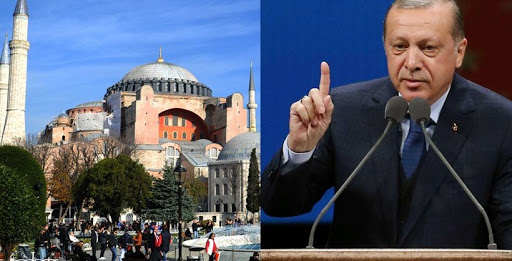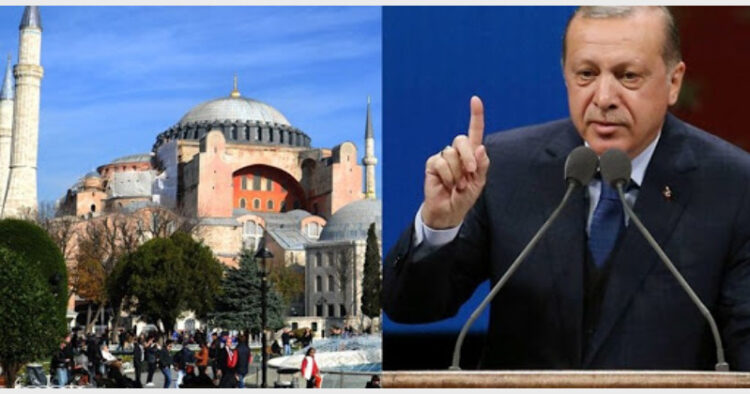
Turkish President Recep Tayyip Erdogan announced Friday that the Hagia Sophia, ancient Christian Church, would be reopened for Muslim worship, sparking fury in the Christian community and neighbouring Greece.
Clearing the way for converting the church into a mosque, a top Turkish court had revoked the sixth-century Byzantine monument’s status as a museum.
With Turkey announcing the conversion of Hagia Sophia into a mosque, it appears the prediction that Erdogan, a hardcore Islamist, wants to revive the Ottoman Caliphate by 2023, would come true.
Built in AD 537, during the reign of the Roman emperor Justinian I, it was then the world’s largest interior space and the first to employ a fully pendentive dome.
The UNESCO World Heritage site in historic Istanbul, Hagia Sophia was a popular tourist attraction. It is considered the epitome of Byzantine architecture and is said to have “changed the history of architecture”. However, the cathedral was converted into a mosque after the Ottoman conquest of Constantinople in 1453. In 1935, it was secularised into a museum.
The Council of State, Turkey’s highest administrative court, unanimously cancelled a 1934 cabinet decision to turn it into a museum and said Hagia Sophia was registered as a mosque in its property deeds.
According to reports, the landmark ruling could inflame tensions not just with the West and Turkey’s historic foe Greece but also Russia, with which Erdogan has forged an increasingly close partnership in recent years.
Sharing a presidential decree which named Hagia Sophia as a “mosque”, Erdogan announced its administration would be handed over to Turkey’s religious affairs directorate known as Diyanet.
“May we be blessed,” he commented. The decree was published on the official gazette.
According to reports by news agency Agence France-Presse, a few hundred Turks carrying Turkish flags gathered outside Hagia Sophia shouting “Chains broken, Hagia Sophia reopened”.
‘Millions of Christians not heard’
In a scathing attack on the move by Muslim-majority Turkey, Greece called it an “open provocation to the civilised world”.
“The nationalism displayed by Erdogan… takes his country back six centuries,” Culture Minister Lina Mendoni said in a statement.
“The concern of millions of Christians were not heard,” Russian Orthodox Church spokesman Vladimir Legoida told Interfax news agency.
The decision “shows that all pleas regarding the need to handle the situation extremely delicately were ignored,” he said.
UNESCO chief Audrey Azoulay said she “deeply regrets” the decision made without prior dialogue with the UN’s cultural agency.
The move was also condemned by the US Commission on International Religious Freedom, which said it was an “unequivocal politicisation” of the monument.














Comments